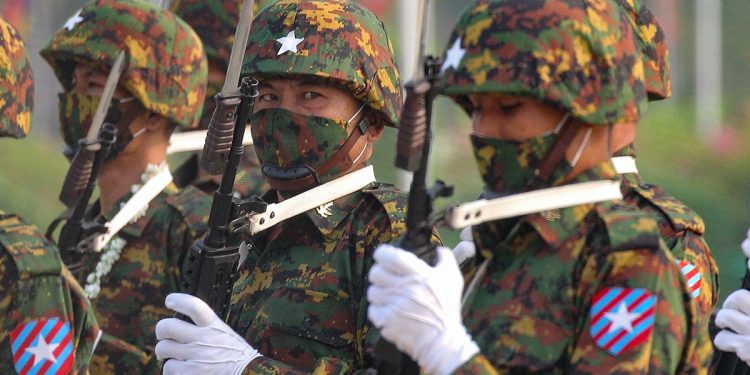Myanmar’s junta activated a national conscription law on Saturday, summoning all young men and women to serve in the armed forces for at least two years as it struggles to crush the growing military offensives by anti-regime ethnic armed groups and their allied resistance forces across the country.
First promulgated 65 years ago, the law was never been enforced by previous governments.
The regime said by-laws will be announced later. Below, The Irrawaddy explains six key points you should know about the People’s Military Service Law.
1. Motive behind the enforcement of the law
The law has been enforced at a time when the Myanmar military has been seriously depleted by casualties in fighting against resistance forces—especially since the launch of Operation 1027 and subsequent offensives—as well as a recruitment crisis, desertions, and, most importantly, a complete lack of public support.
The regime has taken a number of measures to replenish its combat forces, a former major general told The Irrawaddy. The measures include recalling to duty veterans as well as deserters and soldiers who were “absent without leave”, and forcibly recruiting people either for labor or into militia groups known as pyithusit. It was after those measures failed to solve the problem that the regime decided to enforce compulsory conscription, the former major general explained.
Junta spokesman Major General Zaw Min Tun told the junta’s propaganda papers on Monday that the law has been enforced to fight the People’s Defense Forces (PDFs) and ethnic armed organizations (EAOs), and to defend national sovereignty, “as some superpowers use human rights, democracy and counterterrorism as a pretext to wage wars, proxy wars and impose various forms of sanctions on countries whose governments they do not like.”
2. Who is eligible and who is exempt?
- All men aged 18-35 and women aged 18-27 have to serve.
- The age range is between 18 and 45 for males with specialist expertise, and 18 to 35 for females with specialist expertise.
The duration of military service is said to be no longer than two years, but those who are called up as technicians are required to serve for up to three years. Nonetheless, the service can be extended by up to five years during a state of emergency, such as the current one.
- Temporary deferments can be granted for civil servants, students, those taking care of elderly parents, drug addicts undergoing rehabilitation, those receiving medical treatment and those serving time in prison. (They will eventually have to serve the required period in full, even if they are beyond the age limit after the deferment.)
- Exempt are members of religious orders, married women, persons with disabilities, those who are exempted by the conscription board, and those declared by the Myanmar military medical assessment board to be permanently unfit for military service.
3. Punishment for draft evasion
Evading conscription is punishable by three to five years in prison. Pretending to be sick or disabled to evade conscription is punishable by five years in prison.
4. Origin of the law
Myanmar’s first dictator General Ne Win enacted the law in 1959 as the head of an interim government. He staged the first coup in Myanmar in 1962. In November 2010, then-dictator Than Shwe amended the law. It was, however, never enforced under Ne Win, Than Shwe, Thein Sein’s quasi-civilian government, or the since-ousted National League for Democracy government.
Min Aung Hlaing put the law into effect on Feb. 10, 2024, three years after his coup, as his regime seems increasingly unable to cope with the nationwide armed resistance against it.
5. Possible impacts of the law
- The law is expected to seriously impact the human resources of the country, as it targets young people aged between 18 and 35.
- Many people have left Myanmar for safety and a better life following the coup, and enforcement of this law is expected to exacerbate the brain drain. The Myanmar refugee crisis that neighboring countries are facing is expected to worsen.
- As the law will affect both military supporters and non-military supporters, it could fuel opposition to the regime, observers said.
- People are concerned that the Myanmar military, being seriously short of manpower, will increasingly round up civilians to work as porters. It is also likely, analysts believe, that the law will drive more young people to join anti-regime forces.
6. From conscription to corruption and extortion
The law presents an opportunity for the regime to extort money from people, especially well-off families wishing to avoid conscription. The regime, however, will not spare the poor from milking.
It has become routine for junta soldiers who have moved into towns since the coup to make arbitrary arrests during their late-night inspections of households—purportedly looking for unregistered guests—and extort money in exchange for releasing the detainees. Observers say the law will become a cash cow for them.

















